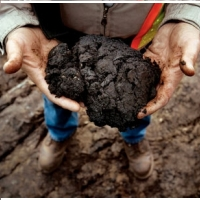The Quiet Plan to Bring Toxic Canadian Tar Sands to California Refineries by Rail
 Tar sands (photo: Lara Solt, Dallas Morning News)
Tar sands (photo: Lara Solt, Dallas Morning News)
While a very public national debate rages over whether the Obama administration should approve the Keystone XL pipeline project for importing tar sands from Canada to U.S. Gulf of Mexico refineries, an oil company is quietly planning to bring the heavy crude to California via rail.
Valero Energy is ramping up its rail delivery system to refineries in Wilmington (L.A. area) and Benicia (Bay Area) for receiving crude oil from Canada, but denies it will be bringing in the dreaded tar sands product that produces more pollution. Valero spokesman Bill Day told Railway Age in August, “I can confirm that neither the Valero Benicia Refinery nor the proposed crude by rail offloading facility there are set up to handle heavy Canadian crude.”
That sounds like a non-denial denial and is not taken seriously by observers who think Canadian tar sands are inevitably heading toward California. “California is the prize,” Greg Karras, senior scientist with Oakland-based Communities for a Better Environment, told New America Media in 2011. “They have this gigantic reserve of fundamentally dirtier oil that they want to exploit, sitting above the best refining country in the world.”
Valero is reportedly adding track extensions and a 50-car rail unloading system to accommodate 60,000 additional barrels of oil a day at Wilmington. A similar expansion in Benicia would facilitate importing another 70,000 barrels. Until now, Valero has brought its crude in via pipeline and tankers.
Tar sands, or oil sands, is considered one of the “dirtiest” sources of petroleum on Earth, loaded with so much carbon that the extraction and use would exacerbate the impact of global warming, according to some scientists. The mixture of sand, other minerals, water and bitumen, a dense form of petroleum resembles tar in appearance. Intense energy is required to process it, giving tar sands a carbon footprint 10-20% greater than other oil.
Alberta, Canada, has a lot of it—an estimated 171.3 billion barrels of oil which, if fully developed, would put Canada in the same camp as OPEC’s leader, Saudi Arabia (which has reserves of 264.2 billion barrels).
Opposition to its shipment via pipeline across the continent from Alberta, through sensitive environs on its way to problematic refining in the Gulf has overshadowed efforts by energy companies to import tar sands via tankers and/or rail to other locations, like California.
Although California is one of the world’s largest producers of crude oil, it still imports around half its crude from the Mideast and Latin America. And some sources think unidentified tar sands are already quietly being shipped to California refineries.
California’s recent introduction of a capped energy trading market would seem to discourage companies bringing in dirtier crude, but it remains to be seen how that plays out in the future.
For now, the shift to rail import of crude and possible refining of tar sands in the state is flying under the radar. But maybe not for long. Valero is not alone in embracing the move. Phillips 66 Co. and Tesoro Corp also have announced plans to use rail cars to bring in more Canadian crude.
As Brant Olson at the Natural Resources Defense Council put it, “For California, rail is the equivalent of the Keystone pipeline.”
–Ken Broder
To Learn More:
California Refineries Prepare For Canadian Crude (by Irvin Dawid, Planetizen)
Valero Moves to Ship Tar Sands By Rail into LA Harbor (by Jack Eidt, Wilderutopia)
Valero Rail Project Fuels Tar Sands Speculation in Bay Area (by Molly Samuel, KQED)
Groups Seek Probe into Low-Grade Crude Shipments to L.A. Refineries (by Louis Sahagun, Los Angeles Times)
CP and UP Forge Canada-to-California CBR Corridor (by Bruce Kelly, Railway Age)
Tar Sands in the East Bay? (by Jean Tepperman, East Bay Express)
Tar Sands Oil Producers Eye California (by Ngoc Nguyen, New America Media)
- Top Stories
- Controversies
- Where is the Money Going?
- California and the Nation
- Appointments and Resignations
- Unusual News
- Latest News
- California Forbids U.S. Immigration Agents from Pretending to be Police
- California Lawmakers Urged to Strip “Self-Dealing” Tax Board of Its Duties
- Big Oil’s Grip on California
- Santa Cruz Police See Homeland Security Betrayal in Use of Gang Roundup as Cover for Immigration Raid
- Oil Companies Face Deadline to Stop Polluting California Groundwater





